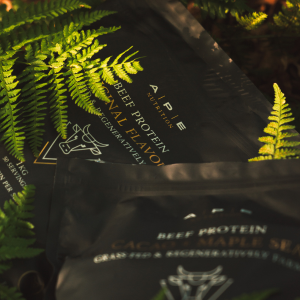What is testosterone?
Testosterone is the primary male sex hormone. It plays a major role in sexual function; sex drive and sperm production as well as being a key anabolic (growth) hormone, responsible for driving muscle and bone size / strength. It's also associated with high levels of energy, motivation, confidence, drive and decisiveness. Although this article is going to focus on the importance of testosterone for men, it's important to note that it also plays a critical role in female health. Having the right levels of this hormone ensures proper function of reproductive tissues in women and similarly to men, plays a pivotal role in bone health and mood. When testosterone levels are optimal men often report feeling more themselves and a high level of general well-being. Whereas, declining testosterone levels are often associated with a decrease in mental health. On a physiological front, lower levels of testosterone have been shown to increase the risk of metabolic diseases, such as heart attacks.* While optimal levels have been shown to improve glycemic control, decrease cortisol (the stress hormone) and reduce the potential of having a stroke.
Over the last few decades, studies have shown a fairly drastic drop in testosterone levels amongst males:
- One analysis looking at 1532 older men (aged 45-80) from 1987-2004 demonstrated that total testosterone levels are decreasing significantly, which is clearly shown on the table illustrated on the thumbnail for this article. If you take the 60 year old males as an example, between 1987-89 on average they had a total testosterone level of over 500 ng/dL, this drops to below 47 between 1995-97 and further to around 440 between 2002-04. To clarify, this isn't following the same 60 year old men as they age, it's looking at different 60 year old men at the same age but in different time periods.
- A later study showed that the total testosterone levels of 4045 young adult males (15-39 years old) are also declining. On average total testosterone was 25% lower in 2015-16 when compared to 1999-2000.
So what does optimal look like when it comes to testosterone levels in men?
In an interview with Andrew Huberman, Ph. D., Dr Peta Attia states that the upper end of total testosterone levels for young men ranges between 725 - 1,200 ng/dl. However, the driving factor behind the positive feeling associated with good testosterone levels isn't as a result of total testosterone but free testosterone.* The majority of testosterone in the body is bound and there's only a small percentage that is free, and it's this free testosterone that supports the key functions of masculinity outlined above. In a healthy male around 2% of testosterone will be free, making the optimal range 18 - 24 ng/dl.
As with everything in the nutrition / health space, people are individuals and must be looked at as such. For example, one person's total testosterone may be high at say 1,100 but lots of this is being bound and therefore their free testosterone levels are below optimal. Whereas another person may have a lower total testosterone level of say 800, but their free testosterone might be right at the top of the upper range at 24 ng/dl.
I appreciate that both of the above studies are focused on total rather than free testosterone. However, it's safe to assume that if total testosterone levels are declining rapidly amongst both younger and older men, free testosterone will also be dropping off. Also from my own conversations with men, especially younger men, I can confirm that there's a lot of guys out their experiencing symptoms of low free testosterone.
It's important to note that testosterone naturally declines as men age. However over recent decades the trend is that testosterone levels are declining at an earlier age and more rapidly as demonstrated above. It's also really sad to observe that the naturally occurring spike in testosterone, which should be experienced by young males is in some cases being blunted. Therefore men aren't only fighting an uphill battle to prevent their testosterone levels dropping off at a greater rate, but they're also starting out with lower levels to begin with.
Why are testosterone levels dropping off and what can you do about it?
There are a multitude of reasons for this trending decline, including;
- Increases in chronic stress (low levels of consistent stress) // testosterone and cortisol (the stress hormone) compete for the same substrate material and therefore, the higher your stress levels, the lower your testosterone. In the modern world it's pretty hard to avoid bouts of chronic stress, so it's important to learn ways to reduce stress and knock your body into a parasympathetic (rest and digest) state. My personal favourite is to walk barefoot on the earth or go swimming in a river or the sea. When I go to do one of these activities, I'll put my phone on aeroplane mode so I don't get disturbed. The last thing you want is to get interrupted by a shitty email when you're goal is stress reduction. Other great alternatives for reducing stress are breath-work and meditation. As little as five minutes a day of either can help. For breath-work I use the Shift app and for meditation I use Insight Timer. When people commonly think of stress, they imagine a hectic day at work or rushing because they're late to an appointment. However, a huge contributor to our allostatic (total) load of stress that people often don't consider is diet. Every time we eat, we either have the opportunity to give our body the raw materials it needs to bolster health or we consume foods that cause oxidative damage. One of the major causes of the latter is vegetable oils; like rapeseed (also called canola), corn, cottonseed, soy, sunflower, safflower, grapeseed and ricebran. These oils have been linked to all the chronic diseases we’re seeing a huge rise in today, most notably; , obesity, type two diabetes, cancer and heart disease. However, there's a really easy fix to this issue. Simply go back to eating and cooking with the fats your great grandparents used; grass-fed butter, beef tallow and ghee. These are packed with beneficial fat soluble vitamins and as long as they’re not over consumed, nourish the body and don’t cause inflammation.
- The sleep when you're dead attitude // Mathew Walker, the author of Why We Sleep, stated that ‘men who are sleeping 5-6 hours per night will have a level of testosterone that of 10 years their senior.' This is because the majority of testosterone release in men occurs during sleep*, meaning the less sleep you're getting, the less testosterone you'll be producing. Really you want to be aiming for 7-8 hours of high quality sleep per night. Some of the best ways to ensure you're getting good quality sleep is to expose your eyes to sunlight as soon as you wake up in the morning. Then in the evening try to eat your last meal at least two hours before bed and don't expose yourself to blue light after you've eaten. Blue light is the type given off by TV's, laptop's, phones and the standard light bulbs in your house. The issue with looking at these, is that this type of light has only been around for about the last 140 years and our biology hasn't adapted to it. Therefore when you look at this type of light (as opposed to firelight) your body thinks the sun is still up, so doesn't release melatonin, a hormone which is key to us falling asleep. I appreciate that not looking at blue light for a couple hours before going to bed might seem like an impossible task, so to get around this, you can use blue light blocking glasses. These filter out blue light, allowing you to still look at screens later in the evening without preventing melatonin from being released. I get mine from Sleep Better Live Better: You can follow this link to get 10% off your order. That said, blue light is just part of the issue here. Lots of people are staying up late working or watching TV, which also isn't conducive to getting your body into a relaxed state for sleep, even if you are wearing blue light blockers whilst doing it. Try reading a book, doing some breathwork or stretching instead.
- A fear of cholesterol and meat // cholesterol acts as a building block for testosterone production. Therefore if you want optimal testosterone levels, you need to make sure your liver is healthy as this produces cholesterol within the body and you're getting enough cholesterol through your diet. As a result of all the anti-red meat / cholesterol propaganda that's been pushed since Ancel Key's infamous Seven Countries Study in 1958, you'll probably be surprised to hear that 70% of cholesterol is actually synthesised in the body by the liver and only 30% comes from our diets. That's why it's important to focus on liver health first, and a great way to do this is to include grass-fed liver in your diet, as this contains all the nutrients needed to support healthy liver function. Also you'll want to prioritise getting healthy sources of cholesterol in through your diet; eggs, cheese, shellfish, steak, organ meat and full fat yoghurt are all great options. Eating ample meat, especially red meat, is also important as it contains other key nutrients like zinc and b-vitamins, which are precursors for testosterone production.
- Endocrine disrupters // a prime example of this is BPA, a compound often found in plastic containers, which leaches into food and drink, especially when the plastic is heated. For example by putting it in a microwave or leaving it in the sun (think of how many plastic water bottles you see left boiling up on the back seat of cars). BPA acts as a xenoestrogen that binds to oestrogen receptor sites in the body throwing out our delicate hormone balance. High levels of oestrogen in men has been linked with infertility, gynecomastia (man boobs), erectile dysfunction, reduced sex drive, low energy / motivation and loss of muscle mass. Basically the symptoms are the opposite of what a man with high natural levels of testosterone generally reports. Xenoestrogens have also been found in tap water, artificial scents (synthetic candles, air fresheners, deodorant, aftershave, etc), cleaning products (both for yourself and your home), laundry products, the off gassing from new home furnishings (mattresses, sofas, carpets, etc) and sun cream. This may sound like a lot of things to cut out of your life, but from doing it myself over the last few years, it's much easier than it first appears. I quickly realised that; 1) I unnecessarily overused a lot of these things and 2) there's healthy versions of all of them that don't contain endocrine disrupting chemicals. I invested in a water / shower / bath filter, glass containers and found health conscious companies that made versions of everything else. Izzi even started making our own candles with essential oils and cleaning spray using lemon juice, white vinegar and water.
- Increased consumption of soy // Soy has high levels of phytoestrogens, which mimic the female hormone oestrogen and has the same impact as xenoestrogens outlined above. The solution to this one is simple, avoid soy in your diet as much as possible.
- Low carb diets // sex hormone binding globulin (SHBG) sits on a sea-saw with insulin, meaning when insulin is low all the time, SHBG is high. SHBG is one of the main molecules that binds to total testosterone preventing it from being free testosterone. Therefore a low carb diet, could increase SHBG and therefore decrease free testosterone. This doesn't mean you need to eat a high carb diet, but it does mean that following an ultra low carb diet like strict carnivore or keto for a long time can negatively impact testosterone production. Personally I like eating a keto style diet for breakfast and lunch. It's what I've found best enables me to focus for work and training. However, I do include a good amount of carbs in my post training and evening meals. Personally I've found doing this creates a best of both worlds scenario in which leaving carbs out of my diet earlier in the day gives me more drive and then including them post training enables me to recover and sleep better. However, like I said earlier, when it comes to nutrition everyone needs their own individual approach so experiment and find what works best for you.
The above isn't an exhaustive list and there's other things out there like alcohol that can lower testosterone as well as activities such as weight training and ice baths that have been shown to boost it. However, integrating the six points above will take you a long way to optimising your testosterone.
If you're looking to take things one step further, there's also a few supplements out there that can help give you that extra boost.
Two that are getting quite a bit of recognition currently are Fadogia Argestis and Tongkat Ali. If you're interested in learning more about these two, Andrew Hubmerman's podcast 'Developing a Rational Approach to Supplementation for Health & Performance' is a great place to start. Although this is a great podcast, I really don't agree with his stance on Greens Powders. Personally I feel these are a waste of money and you'd be much better off consuming Beef Liver instead as this contains lots of the micronutrients people are deficient in, in the most absorbable form and with no anti-nutrients. However, that's an article in itself (coming soon).
In terms of what we offer at APE, people have been experiencing amazing results using our Optimised Male, which contains 50% Beef Liver and 50% Beef Testicle. As with all our nose-to-tail products, the organs are grass-fed, hormone / antibiotic free & regeneratively farmed. These organs in particular are packed with bioavailable b-vitamins, zinc & transforming growth factors, which all provide targeted support for key functions of masculinity, including testosterone production. Analysis done on beef testicles has also shown that they actually contain testosterone itself.
We've got both qualitative and quantitative data to back up the impact this product has had on our customers testosterone levels.
-
John Review - "STAPLE - One of the only supplements I've ever taken that I feel noticeably better while taking. I feel like I've got more energy, muscle gain in the gym seems accelerated, sex drive is up and generally feel better! Also from a company I trust to source all of its bits from only the best places. I've signed up for the reoccurring monthly subscription for this and can't see myself cancelling."
-
One of our customers actually tested their total testosterone levels before and after taking our Optimised Male product for three months (and not changing anything else). Their levels went from around 25 nmol/L (721 ng/dL) to 29 nmol/L (837 ng/dL). If you read our reviews, lots of other customers report testosterone increases through subjective markers, like; more motivation, confidence, higher sex drive, etc.
-
Luke Review - "PROOF'S IN THE PUDDING - This supplement has played a massive affect on my levels of Testosterone in the gym & in my sex life, I have been on the regime for 4 weeks now. Starting at 3 capsules a morning, now for the last 3 weeks I have been taking 6-8 capsules . I started feeling a serious change in my T-levels around week 2.5.The results in my feels speak for themselves, a fantastic product brother. Going to be a regular supplement of mine for sure!"
There's plenty more reviews to this effect on the Optimised Male page of our website if you'd like to take a look for yourself.
In summary, optimising testosterone levels is extremely important for men. If you're feeling a lack of sex drive, energy, motivation, confidence, decisiveness or struggle to gain muscle when training appropriately, it could be down to having low levels of free testosterone. To counteract this, I'd start out by implementing the six dietary and lifestyle factors detailed above. If you're looking for an additional boost, it would be a good idea to add in some testosterone supporting supplementation on top. To get a better idea of where you're at and to track your progress it would also be helpful to get a full blood work panel done or at least one that analyses your hormones. If this is something you're interested in and want to work with a professional to interpret your blood work and create you a diet, training and lifestyle plan to optimise your health, send me a message on Instagram or through the contact us form on our website and I'll put you in touch with a practitioner I trust.
References
- Normalisation of testosterone level is associated with reduced incidence of myocardial infarction and mortality in men: https://pubmed.ncbi.nlm.nih.gov/26248567/
- A Population-Level Decline in Serum Testosterone Levels in American Men: https://academic.oup.com/jcem/article/92/1/196/2598434?login=false
- Decline in Serum Testosterone Levels Among Adolescent and Young Adult Men in the USA: https://pubmed.ncbi.nlm.nih.gov/32081788/
- Dr Peter Attia: Exercise, Nutrition, Hormones for Vitality & Longevity: https://www.youtube.com/watch?v=DTCmprPCDqc
- Effects of acutely displaced sleep on testosterone: https://pubmed.ncbi.nlm.nih.gov/15914523/
- Developing a Rational Approach to Supplementation for Health & Performance | Huberman Lab Podcast: https://www.youtube.com/watch?v=tLS6t3FVOTI






